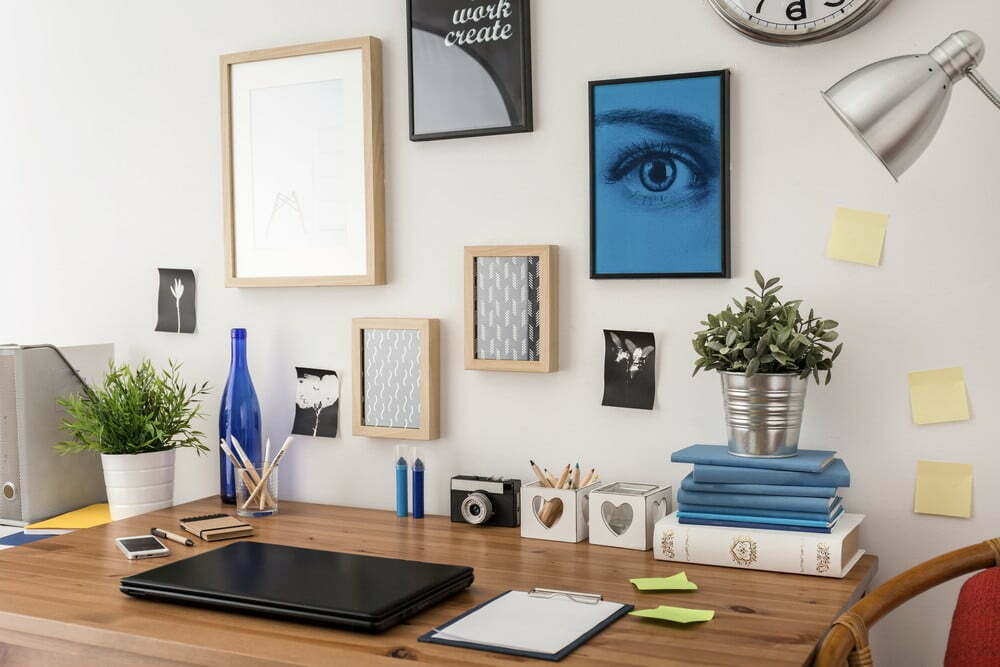A well-organized study space is vital for effective studying. It can provide the necessary motivation for you to be productive and focused in order to achieve your goals. The exciting thing is that you can convert any space into a study area. If you’re not sure where to start, we’ve listed some valuable tips to help you create your ideal study space.
1. Organize your study supplies and store unwanted items.

Organizing your study supplies is critical for creating your ideal workstation. Avoid leaving supplies spread out all over the desk, especially if you have other storage areas or drawers to put them in. Having too much clutter on your desk space can leave you feeling stressed out and overwhelmed.
Also, try to keep essential study supplies like notecards, paper, pencils, highlighters, and erasers in a desk drawer. Only your study materials should be on your desk for a more efficient studying process.
For example, let’s say you enrolled in a sales training program and your ultimate goal may be to become a sales manager or a sales rep at a Fortune 500 company. Either way, you’ll need to take some sales courses to prepare for the professional exam. While studying for the exam or a presentation, your study materials should be within an arm’s reach. That way, you get to save a considerable amount of time that you would have otherwise spent fumbling around for a resource, ruler, or notecards.
2. Get a comfortable desk and chair
There’s nothing wrong with wanting to be comfortable while studying. However, too much comfort can cause you to doze off or lose focus. Your bed isn’t an ideal study space as you could easily fall asleep while studying.
Rather, get a work desk and a comfortable chair for your study space. If you’re working with a computer, you may need a computer desk. Avoid fancy chairs that recline, roll, or rotate as they could act as distractions.
3. Decorate your study space to help with motivation.

Your study space should be relaxing and comfortable enough for you to concentrate on your studies. Decorating your study space helps you personalize your space for additional comfort.
Interior décor experts recommend keeping the design minimal to mitigate distractions, especially if you easily get distracted. Remove all posters and distracting elements from your study area. If you have a dedicated study room, you may decide to paint it to reflect your style. Feel free to add wall décor that resonates with the things you love.
4. Ensure there is adequate lighting.
A typical study space should have sufficient lighting to enhance the study experience. A study space that’s too dark can make you quickly nod off or cause eye strain. Avoid harsh lighting fixtures like fluorescent light because they pose some risks to your eyes.
Consider using a desk lamp to focus light on your study space. You can also use an overhead or nearby table light to illuminate the study area. Natural light is also an excellent lighting choice, given that it can be calming and refreshing. The downside to natural light is that it increases the urge to stare out the window, which could be a significant distraction.
5. Consider buying a clock to help you keep track of time

Using your phone as a dictionary, calculator, or timepiece presents an open invitation to distraction. Inserting a clock into your study space can motivate you to study for a long time. Some people use the clock or timer feature to set study goals and ensure precise time-keeping. Timers are vital for preparing for timed exams like the ACT and SAT.
If you’re not comfortable with the tick-tock sound of an analog clock, consider getting a digital clock instead. Aim to study for 30 minutes at a stretch. Avoid any distractions during that period. You could take periodic breaks to reward yourself for sticking to your schedule.



